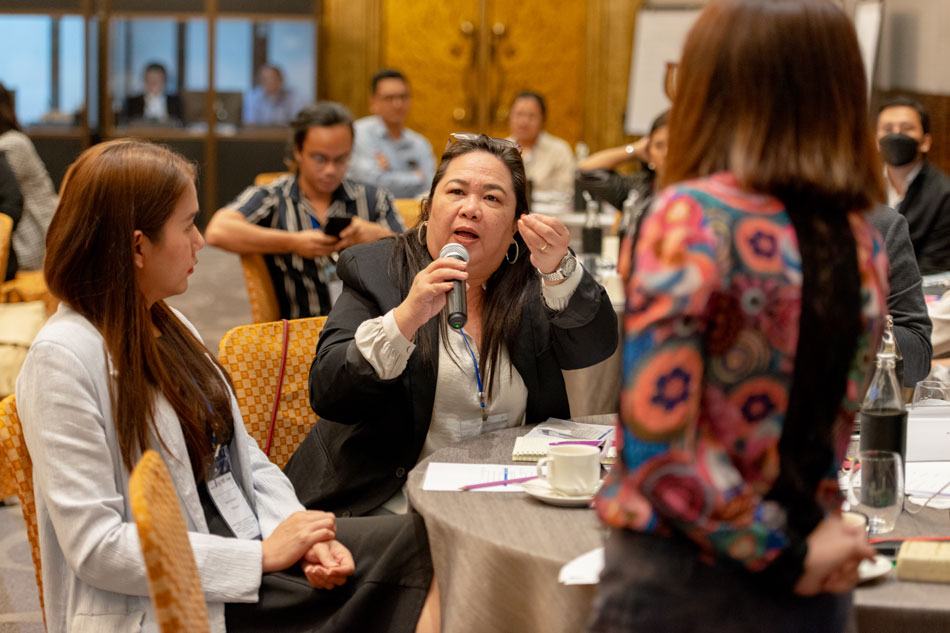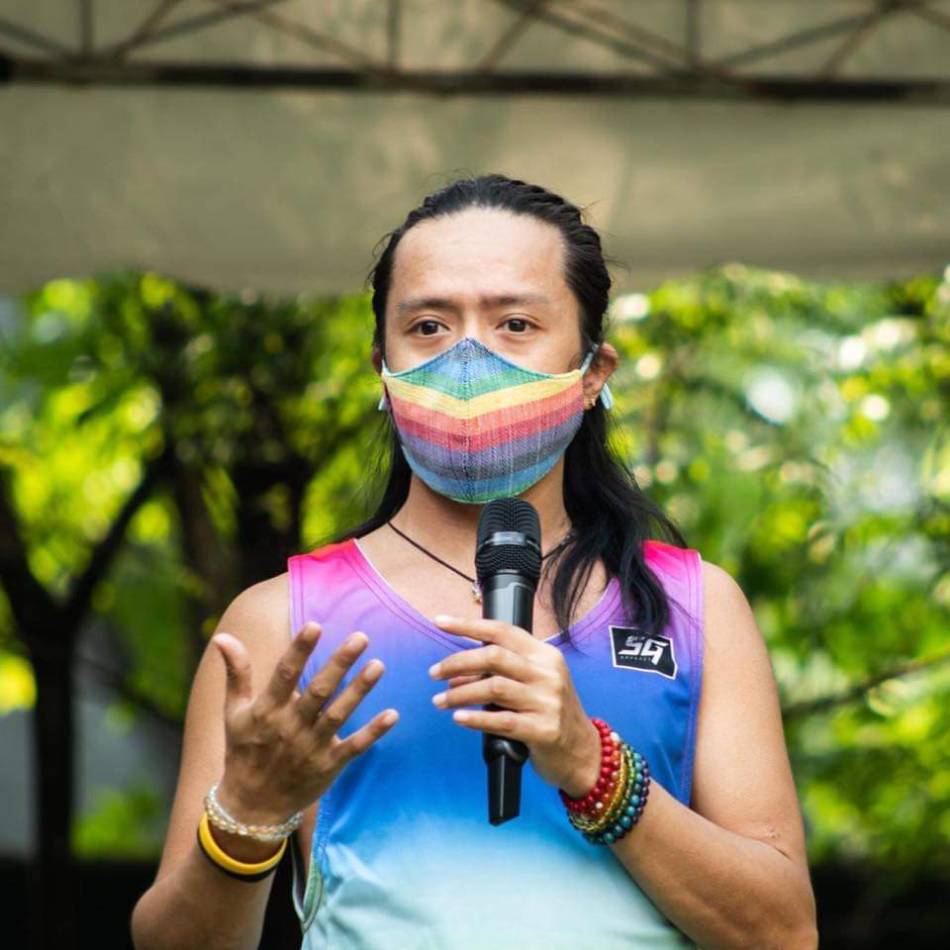Standing up to HIV stigma through social media
ADVERTISEMENT

Welcome, Kapamilya! We use cookies to improve your browsing experience. Continuing to use this site means you agree to our use of cookies. Tell me more!
Standing up to HIV stigma through social media
Jeffrey Hernaez,
ABS-CBN News
Published Jul 11, 2023 05:57 PM PHT
|
Updated Jul 11, 2023 08:17 PM PHT
Eros De Vera, a person living with HIV (PLHIV), first joined the #NormalizingHIVChallenge on social media three years ago. He was one of the few members of the PLHIV community who participated in the call, which immediately went viral after South African nurse and clinician Angela Motsusi first coined the hashtag in 2020.
Eros De Vera, a person living with HIV (PLHIV), first joined the #NormalizingHIVChallenge on social media three years ago. He was one of the few members of the PLHIV community who participated in the call, which immediately went viral after South African nurse and clinician Angela Motsusi first coined the hashtag in 2020.
The challenge was both easy and hard for those living with HIV, Eros said. They just need to post on their social media accounts their HIV status and when they were diagnosed. Also included in the challenge were naming their home countries, occupation, and relationship status. Their names and photos may also be part of the post, but Eros said that it is up to them if they would like to disclose their identities.
The challenge was both easy and hard for those living with HIV, Eros said. They just need to post on their social media accounts their HIV status and when they were diagnosed. Also included in the challenge were naming their home countries, occupation, and relationship status. Their names and photos may also be part of the post, but Eros said that it is up to them if they would like to disclose their identities.
Eros, who identifies as non-binary, stressed that the term "normalizing" does not mean having HIV is encouraged but is an appeal to the public to end stigma and discrimination against the community.
Eros, who identifies as non-binary, stressed that the term "normalizing" does not mean having HIV is encouraged but is an appeal to the public to end stigma and discrimination against the community.
"It's not normalizing getting HIV, but to normalize people living with the virus as regular people. The challenge is not even suggesting any sexual innuendos," Eros explained.
"It's not normalizing getting HIV, but to normalize people living with the virus as regular people. The challenge is not even suggesting any sexual innuendos," Eros explained.
ADVERTISEMENT
"Iyong #NormalizingHIVChallenge kasi, hindi naman kinakailangan mag-come out 'yung identity kundi maging normal sa iyo na ipakilala mo na kahit may HIV ka hindi mo siya dapat ikahiya at pati yung mga tao na makakarinig at makakabasa nung status na iyon, hindi ka dapat bigyan ng mga discriminatory na mga feelings, it's just a status - may HIV ka, may HIV ka - parang ganun lang siya," Eros added.
"Iyong #NormalizingHIVChallenge kasi, hindi naman kinakailangan mag-come out 'yung identity kundi maging normal sa iyo na ipakilala mo na kahit may HIV ka hindi mo siya dapat ikahiya at pati yung mga tao na makakarinig at makakabasa nung status na iyon, hindi ka dapat bigyan ng mga discriminatory na mga feelings, it's just a status - may HIV ka, may HIV ka - parang ganun lang siya," Eros added.
Michael Buitron, HIVE or HIV Elders coordinator for APLA Health, a non-profit HIV service organization in the United States, in a tweet, further explained that: "#NormalizingHIVChallenge is about destigmatizing HIV. It's about treating PLHW as normal humans, not as vectors of the disease. The only reason HIV-negative men see this as sexual is because it triggers their realization that they are vulnerable to HIV infection from condomless sex."
Michael Buitron, HIVE or HIV Elders coordinator for APLA Health, a non-profit HIV service organization in the United States, in a tweet, further explained that: "#NormalizingHIVChallenge is about destigmatizing HIV. It's about treating PLHW as normal humans, not as vectors of the disease. The only reason HIV-negative men see this as sexual is because it triggers their realization that they are vulnerable to HIV infection from condomless sex."
"NormalizingHIVChallenge is about visibility, which is the only way to abolish #HIVstigma," he said.
"NormalizingHIVChallenge is about visibility, which is the only way to abolish #HIVstigma," he said.
PLHIV RETWEETS
Just recently, Eros decided to update the 3-year-old tweet with a more recent photo. Little did they know that the simple update would again create waves across the PLHIV community and give a new life to the social media campaign.
Just recently, Eros decided to update the 3-year-old tweet with a more recent photo. Little did they know that the simple update would again create waves across the PLHIV community and give a new life to the social media campaign.
"Nagulat din ako na medyo nagbigay traction siya this year. Parang ang ginawa ko lang talaga initially was to change my picture and the age doon sa hashtag, kasi nga parang that picture was taken years ago. I was still 38 years old at that time. Sabi ko update natin 'yung naka-pin, sabi ko 40 years old na ako, sabi ko bigyan na natin sila ng bagong mukha, ito na yung 40 years old na si Eros," they said.
"Nagulat din ako na medyo nagbigay traction siya this year. Parang ang ginawa ko lang talaga initially was to change my picture and the age doon sa hashtag, kasi nga parang that picture was taken years ago. I was still 38 years old at that time. Sabi ko update natin 'yung naka-pin, sabi ko 40 years old na ako, sabi ko bigyan na natin sila ng bagong mukha, ito na yung 40 years old na si Eros," they said.
ADVERTISEMENT
"I'm actually happy na nangyari kasi iyon 'yung challenge talaga, even kasi sa self, nagsisimula sa sarili iyon na ayaw mong i-share sa iba kahit sa mga closest friends mo kasi may takot ka na baka lumayo sila, saka may takot na baka may makarinig o umabot yung balita sa iba, matanggalan ng trabaho, yung ganung discriminatory na practices ng ibang mga tao. Parang people joining was refreshing dahil literal na on a day-to-day basis mayroon at mayroon pa rin akong hindi nare-retweet," Eros added.
"I'm actually happy na nangyari kasi iyon 'yung challenge talaga, even kasi sa self, nagsisimula sa sarili iyon na ayaw mong i-share sa iba kahit sa mga closest friends mo kasi may takot ka na baka lumayo sila, saka may takot na baka may makarinig o umabot yung balita sa iba, matanggalan ng trabaho, yung ganung discriminatory na practices ng ibang mga tao. Parang people joining was refreshing dahil literal na on a day-to-day basis mayroon at mayroon pa rin akong hindi nare-retweet," Eros added.
Eros now actively helps the PLHIV community as a volunteer. Eros was lucky not to have experienced discrimination, but it is not the same with other members of the community.
Eros now actively helps the PLHIV community as a volunteer. Eros was lucky not to have experienced discrimination, but it is not the same with other members of the community.
"Akala nila siguro hindi discriminatory act, pero yung simpleng paghihiwalay ng gamit sa bahay, 'yung ultimong ihihiwalay ang tuwalya, ihihiwalay ang mga kubyertos, pagkain, ihihiwalay ang baso, that is already an act of discrimination. Parang hindi po ito isa sa paraan para makahawa ng HIV, pero bibigyan ka ng separate set ng mga gamit sa bahay, that's a form of discrimination already," said Eros.
"Akala nila siguro hindi discriminatory act, pero yung simpleng paghihiwalay ng gamit sa bahay, 'yung ultimong ihihiwalay ang tuwalya, ihihiwalay ang mga kubyertos, pagkain, ihihiwalay ang baso, that is already an act of discrimination. Parang hindi po ito isa sa paraan para makahawa ng HIV, pero bibigyan ka ng separate set ng mga gamit sa bahay, that's a form of discrimination already," said Eros.
"Hanggang ngayon, parang 2023 na pero may naghihiwalay pa rin po ng gamit, pati 'yung simpleng pagyakap, yung simpleng paghalik na minsan, actually, baka ito yung mga bagay na kailangan ng isang tao na may HIV – a simple hug or a simple kiss from friends and family, minsan ipagkakait din iyon because of the old information na hindi pa napapalitan sa kanila," they added.
"Hanggang ngayon, parang 2023 na pero may naghihiwalay pa rin po ng gamit, pati 'yung simpleng pagyakap, yung simpleng paghalik na minsan, actually, baka ito yung mga bagay na kailangan ng isang tao na may HIV – a simple hug or a simple kiss from friends and family, minsan ipagkakait din iyon because of the old information na hindi pa napapalitan sa kanila," they added.
Just like fellow PLHIV Terrie Casuncad who was diagnosed last 2017.
Just like fellow PLHIV Terrie Casuncad who was diagnosed last 2017.
ADVERTISEMENT
"After I graduated college in 2018, lahat ng inapplayan kong company, sinasabi ko rin na I have HIV kapag they ask me if I have medical conditions, kahit na I believe na next step na ako, final interview na lang, then later on sabihin na lang, they will just call me back. Sabi ko, this is because of my status kaya hindi ako natatanggap sa mga trabaho," said Terrie.
"After I graduated college in 2018, lahat ng inapplayan kong company, sinasabi ko rin na I have HIV kapag they ask me if I have medical conditions, kahit na I believe na next step na ako, final interview na lang, then later on sabihin na lang, they will just call me back. Sabi ko, this is because of my status kaya hindi ako natatanggap sa mga trabaho," said Terrie.
"May dentist, na-discriminate ako ng sobra, dahil bakit hindi ko daw sinabi agad na may HIV ako which is I also have a right not to say but then sinisi ako kasi natusok daw siya ng mismong anesthesia na sinaksak sa akin na syringe. That's really painful, na kasalanan ko ba na may HIV ako na I cannot have these services or I cannot even work because of my status?" added Terrie.
"May dentist, na-discriminate ako ng sobra, dahil bakit hindi ko daw sinabi agad na may HIV ako which is I also have a right not to say but then sinisi ako kasi natusok daw siya ng mismong anesthesia na sinaksak sa akin na syringe. That's really painful, na kasalanan ko ba na may HIV ako na I cannot have these services or I cannot even work because of my status?" added Terrie.
The United Nations Joint Programme on HIV/AIDS or UNAIDS welcomes the social media challenge.
The United Nations Joint Programme on HIV/AIDS or UNAIDS welcomes the social media challenge.
"We're happy with that particular trend. Part of the goal of the Joint United Nations Programme for HIV/AIDS is to reduce stigma and discrimination. People becoming open about their status and disclosing where they are, if they are taking treatment, status of the viral load if undetectable or going down is really a good way in terms of normalizing, putting a face to this particular problem of HIV, and also it makes them more comfortable to talk about it towards the public. Hopefully, for persons who are not yet aware of HIV and AIDS, how you get it, how you can continue to have a normal life even if you are infected," said UNAIDS Philippines Service for All Adviser Dr. Van Phillip Baton.
"We're happy with that particular trend. Part of the goal of the Joint United Nations Programme for HIV/AIDS is to reduce stigma and discrimination. People becoming open about their status and disclosing where they are, if they are taking treatment, status of the viral load if undetectable or going down is really a good way in terms of normalizing, putting a face to this particular problem of HIV, and also it makes them more comfortable to talk about it towards the public. Hopefully, for persons who are not yet aware of HIV and AIDS, how you get it, how you can continue to have a normal life even if you are infected," said UNAIDS Philippines Service for All Adviser Dr. Van Phillip Baton.
This June, the UNAIDS gathered journalists, health advocates, and government representatives from the Asia Pacific region in Bangkok, Thailand, where participants shared their insights on how to effectively ramp up evidence-based stigma and discrimination reduction strategies in the region.
This June, the UNAIDS gathered journalists, health advocates, and government representatives from the Asia Pacific region in Bangkok, Thailand, where participants shared their insights on how to effectively ramp up evidence-based stigma and discrimination reduction strategies in the region.
ADVERTISEMENT
"This methodology engages government, media, and community stakeholders to facilitate learning and cross-country sharing around approaches and strategies to lower HIV-related prejudice and rights violations in both healthcare and justice settings, as well as shaping public opinion. It’s a cross-fertilization between technical-level intervention models and winning hearts and minds," said UNAIDS Regional Human Rights and Law Adviser, Quinten Lataire.
"This methodology engages government, media, and community stakeholders to facilitate learning and cross-country sharing around approaches and strategies to lower HIV-related prejudice and rights violations in both healthcare and justice settings, as well as shaping public opinion. It’s a cross-fertilization between technical-level intervention models and winning hearts and minds," said UNAIDS Regional Human Rights and Law Adviser, Quinten Lataire.
The UNAIDS asserts that ending HIV and AIDS stigma and discrimination will translate to a further reduction in the number of new cases and possibly lead to an AIDS-free Philippines by the year 2030.
The UNAIDS asserts that ending HIV and AIDS stigma and discrimination will translate to a further reduction in the number of new cases and possibly lead to an AIDS-free Philippines by the year 2030.
"It's a very good venue (social media) for them to talk about it. These persons are coming out publicly because if we believe that disclosure is one of the keys for people to be comfortable, and if they are comfortable with their status, they will be comfortable seeking treatment. If they are all in treatment, and we get the goal of 95% of those who are diagnosed with HIV, definitely we can reach the goal of an AIDS-free Philippines by 2030," Baton explained.
"It's a very good venue (social media) for them to talk about it. These persons are coming out publicly because if we believe that disclosure is one of the keys for people to be comfortable, and if they are comfortable with their status, they will be comfortable seeking treatment. If they are all in treatment, and we get the goal of 95% of those who are diagnosed with HIV, definitely we can reach the goal of an AIDS-free Philippines by 2030," Baton explained.
"One of the factors that would lead to continuous increase in HIV cases is stigma and discrimination because if there is discrimination for those living with HIV or those who are at risk of getting HIV, then it would lead to them not being comfortable or confident to seek treatment with our medical workers or our healthcare workers even if these are run by our community-based organization," Baton added.
"One of the factors that would lead to continuous increase in HIV cases is stigma and discrimination because if there is discrimination for those living with HIV or those who are at risk of getting HIV, then it would lead to them not being comfortable or confident to seek treatment with our medical workers or our healthcare workers even if these are run by our community-based organization," Baton added.
Data from UNAIDS shows that 32 percent of PLHIV respondents avoid going to local clinics because of their HIV status.
Data from UNAIDS shows that 32 percent of PLHIV respondents avoid going to local clinics because of their HIV status.
ADVERTISEMENT
"One of the six settings for stigma and discrimination is the healthcare setting. We are still getting reports of people living with HIV who are experiencing discrimination in hospitals or clinics where they are going. That is one of the reasons why people are stopping taking their medication, and that is quite unfortunate because it is life-saving medication and it can prevent transmissions to their partners and family members," Baton explained.
"One of the six settings for stigma and discrimination is the healthcare setting. We are still getting reports of people living with HIV who are experiencing discrimination in hospitals or clinics where they are going. That is one of the reasons why people are stopping taking their medication, and that is quite unfortunate because it is life-saving medication and it can prevent transmissions to their partners and family members," Baton explained.
Other settings include community, workplace, education, justice, and emergency.
Other settings include community, workplace, education, justice, and emergency.
This is where local support groups like the TLF Share Collective come in. Noemi Leis, the program manager of the group, says that the still rampant stigma and discrimination affect the mental health of persons living with HIV.
This is where local support groups like the TLF Share Collective come in. Noemi Leis, the program manager of the group, says that the still rampant stigma and discrimination affect the mental health of persons living with HIV.
"Kasi once naunahan na ng discrimination iyan, bumababa na rin yung self-esteem at yung tiwala sa pag-access ng mga serbisyo kung ano man lalo na sa education, sa health pag nagkakasakit, mas natatakot silang lumabas doon sa kanilang environment hanggang hindi sila nakakaramdam na safe sila," said Leis.
"Kasi once naunahan na ng discrimination iyan, bumababa na rin yung self-esteem at yung tiwala sa pag-access ng mga serbisyo kung ano man lalo na sa education, sa health pag nagkakasakit, mas natatakot silang lumabas doon sa kanilang environment hanggang hindi sila nakakaramdam na safe sila," said Leis.
To help with the campaign against stigma and discrimination, TLF Share Collective conducts community-level legal literacy training or rights education.
To help with the campaign against stigma and discrimination, TLF Share Collective conducts community-level legal literacy training or rights education.
ADVERTISEMENT
"Ang nakakatuwa dito kasi hindi nila alam nga na discrimination na, even sexual assault or even yung power relation na bata ka, nao-overpower ka ng mga matatanda so minsan doon pa lang sa kanilang community hindi nila na-re-recognize. Through rights education, nalalaman nila yung mga nangyayari sa paligid nila, yung pakiramdam nila, yung nangyayari sa pamilya hanggang sa lumabas ng bahay hanggang sa school, nare-realize nila na natatapakan na pala yung kanilang karapatan or nadi-discriminate na sila," Leis explained.
"Ang nakakatuwa dito kasi hindi nila alam nga na discrimination na, even sexual assault or even yung power relation na bata ka, nao-overpower ka ng mga matatanda so minsan doon pa lang sa kanilang community hindi nila na-re-recognize. Through rights education, nalalaman nila yung mga nangyayari sa paligid nila, yung pakiramdam nila, yung nangyayari sa pamilya hanggang sa lumabas ng bahay hanggang sa school, nare-realize nila na natatapakan na pala yung kanilang karapatan or nadi-discriminate na sila," Leis explained.
The advocacy group Love Yourself Inc., whose ambassadors include Miss Universe 2015 Pia Alonzo Wurtzbach and other young dynamic celebrities, believes that a wider understanding of HIV and AIDS is the key to ending stigma and discrimination.
The advocacy group Love Yourself Inc., whose ambassadors include Miss Universe 2015 Pia Alonzo Wurtzbach and other young dynamic celebrities, believes that a wider understanding of HIV and AIDS is the key to ending stigma and discrimination.
"Yung discrimination, it is not just about them going outside because of their status, and it's also inside their homes because of ignorance, so napakaimportante na magkaroon ng mas malawak na pagkakaintindi at lahat tayo ay ma-educate about HIV para alam din natin na ang Person Living with HIV ay isang tao. Isang tao na nagkaroon lang ng sakit at nagkaroon lang ng stigma na dikit doon sa HIV," said Love Yourself Inc. volunteer Nicole Silvestre.
"Yung discrimination, it is not just about them going outside because of their status, and it's also inside their homes because of ignorance, so napakaimportante na magkaroon ng mas malawak na pagkakaintindi at lahat tayo ay ma-educate about HIV para alam din natin na ang Person Living with HIV ay isang tao. Isang tao na nagkaroon lang ng sakit at nagkaroon lang ng stigma na dikit doon sa HIV," said Love Yourself Inc. volunteer Nicole Silvestre.
Silvestre also believes that campaigns like the #NormalizingHIVChallenge on social media are an effective way of reaching out to the public, especially the youth.
Silvestre also believes that campaigns like the #NormalizingHIVChallenge on social media are an effective way of reaching out to the public, especially the youth.
"Social media, lahat ng tao mayroon nito, mapa-bata, mapa-matanda. Ngayon, ang mas magandang kunin natin ay yung mga bata, dahil mas magandang i-educate yung mga bata para iyong future natin ay magkaroon tayo ng mas maganda at mas open (na pag-unawa). Iyong social media kasi, from Luzon, Visayas, Mindanao, lahat nakukuha natin, lahat nakakanood, lahat may cellphone, so napakaimportante ng social media lalo na ngayon because of the pandemic," Silvestre stressed.
"Social media, lahat ng tao mayroon nito, mapa-bata, mapa-matanda. Ngayon, ang mas magandang kunin natin ay yung mga bata, dahil mas magandang i-educate yung mga bata para iyong future natin ay magkaroon tayo ng mas maganda at mas open (na pag-unawa). Iyong social media kasi, from Luzon, Visayas, Mindanao, lahat nakukuha natin, lahat nakakanood, lahat may cellphone, so napakaimportante ng social media lalo na ngayon because of the pandemic," Silvestre stressed.
ADVERTISEMENT
INCREASING NUMBERS
UNAIDS Philippines Country Director Dr. Lui Ocampo, in a press conference, said that based on the Global AIDS Monitoring Report, AIDS cases are decreasing globally but continuously increasing in the Philippines.
UNAIDS Philippines Country Director Dr. Lui Ocampo, in a press conference, said that based on the Global AIDS Monitoring Report, AIDS cases are decreasing globally but continuously increasing in the Philippines.
Last May, the Department of Health recorded 1,256 new cases, which translates to an average of 48 cases per day.
Last May, the Department of Health recorded 1,256 new cases, which translates to an average of 48 cases per day.
“We need to break the cycle of HIV transmission for us to reduce the infections. Number one, key and vulnerable populations should have access to preventive services and/or practice protective behavior by using condoms or pre-exposure prophylaxis to retain their HIV-negative status. At the same time, those who are already diagnosed should be on life-saving antiretroviral drugs and should achieve viral suppression. Third, we need to address barriers to accessing services and ensure an enabling environment for the key population, which includes policies, guidelines, sufficient investment in programs, and addressing stigma and discrimination,” Ocampo explains.
“We need to break the cycle of HIV transmission for us to reduce the infections. Number one, key and vulnerable populations should have access to preventive services and/or practice protective behavior by using condoms or pre-exposure prophylaxis to retain their HIV-negative status. At the same time, those who are already diagnosed should be on life-saving antiretroviral drugs and should achieve viral suppression. Third, we need to address barriers to accessing services and ensure an enabling environment for the key population, which includes policies, guidelines, sufficient investment in programs, and addressing stigma and discrimination,” Ocampo explains.
Senator Risa Hontiveros, the author of Republic Act 11166 or the HIV Policy Act, also called for an end to stigma and discrimination against those living with HIV.
Senator Risa Hontiveros, the author of Republic Act 11166 or the HIV Policy Act, also called for an end to stigma and discrimination against those living with HIV.
“What we need is the urgency, certainty, and cooperation of all concerned agencies and institutions to fully implement the law, especially its provisions protecting the rights of PLHIVs to a life free from stigma and discrimination. We must make this fight a priority once more until HIV and AIDS have been eradicated,” said Hontiveros.
“What we need is the urgency, certainty, and cooperation of all concerned agencies and institutions to fully implement the law, especially its provisions protecting the rights of PLHIVs to a life free from stigma and discrimination. We must make this fight a priority once more until HIV and AIDS have been eradicated,” said Hontiveros.
ADVERTISEMENT
'ASSERT RIGHTS'
Eros reminds members of the PLHIV community to assert their rights if and when they experience discrimination in any form.
Eros reminds members of the PLHIV community to assert their rights if and when they experience discrimination in any form.
"Doon sa mga nakararanas ng stigma and discrimination, maging matapang, i-assert niyo yung right ninyo na hindi kayo dapat dini-discriminate dahil bawal po siya sa batas. Mayroon po tayong provision sa batas na puwede mong ihabla ang tao at puwede kang manghingi ng protection to privacy na parang during the hearing na kayo lang, mga people na involved ang makakaalam doon sa kaso, puwede ninyong hilingin iyon sa korte," says Eros.
"Doon sa mga nakararanas ng stigma and discrimination, maging matapang, i-assert niyo yung right ninyo na hindi kayo dapat dini-discriminate dahil bawal po siya sa batas. Mayroon po tayong provision sa batas na puwede mong ihabla ang tao at puwede kang manghingi ng protection to privacy na parang during the hearing na kayo lang, mga people na involved ang makakaalam doon sa kaso, puwede ninyong hilingin iyon sa korte," says Eros.
"Kapag naranasan niyo ng ma-discriminate, lumaban tayo, hindi ito excuse na wag na natin palakihin ang issue, issue pa rin siya kasi kung hindi natin i-call out o hindi natin ipaparamdam sa kanila na protektado tayo ng batas, aabusuhin talaga tayo ng mga taong ito. Kaya maging matapang at lumaban," Eros adds.
"Kapag naranasan niyo ng ma-discriminate, lumaban tayo, hindi ito excuse na wag na natin palakihin ang issue, issue pa rin siya kasi kung hindi natin i-call out o hindi natin ipaparamdam sa kanila na protektado tayo ng batas, aabusuhin talaga tayo ng mga taong ito. Kaya maging matapang at lumaban," Eros adds.
SUPPORT SYSTEM
Terrie, who now works as a community-based screening motivator for HIV& AIDS support house or HASH, meanwhile stressed the importance of a support system coming from family and friends of members of the PLHIV community.
SUPPORT SYSTEM
Terrie, who now works as a community-based screening motivator for HIV& AIDS support house or HASH, meanwhile stressed the importance of a support system coming from family and friends of members of the PLHIV community.
"Mas mabilis yung self acceptance, mas mabilis din tayong makaka-overcome ng mga discriminination na binabato ng tao sa community namin," said Terrie.
"Mas mabilis yung self acceptance, mas mabilis din tayong makaka-overcome ng mga discriminination na binabato ng tao sa community namin," said Terrie.
ADVERTISEMENT
For fellow members of the PLHIV community, Terrie has this reminder.
For fellow members of the PLHIV community, Terrie has this reminder.
"I hope makita niyo po or marinig niyo po yung mga stories ng mga taong nag-struggle and at the same time, after the struggle, naging sucessful. Kasi doon natin makikita na kahit nagkaroon ka ng virus sa loob ng katawan mo, it will never be a hindrance na ma-reach ang mga pangarap mo."
"I hope makita niyo po or marinig niyo po yung mga stories ng mga taong nag-struggle and at the same time, after the struggle, naging sucessful. Kasi doon natin makikita na kahit nagkaroon ka ng virus sa loob ng katawan mo, it will never be a hindrance na ma-reach ang mga pangarap mo."
RELATED VIDEO
ADVERTISEMENT
ADVERTISEMENT



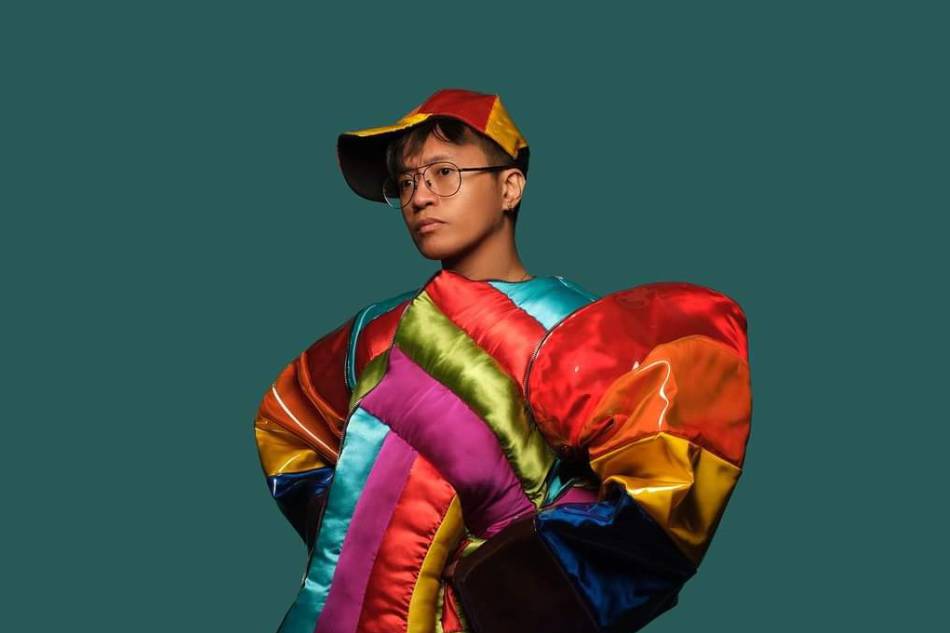
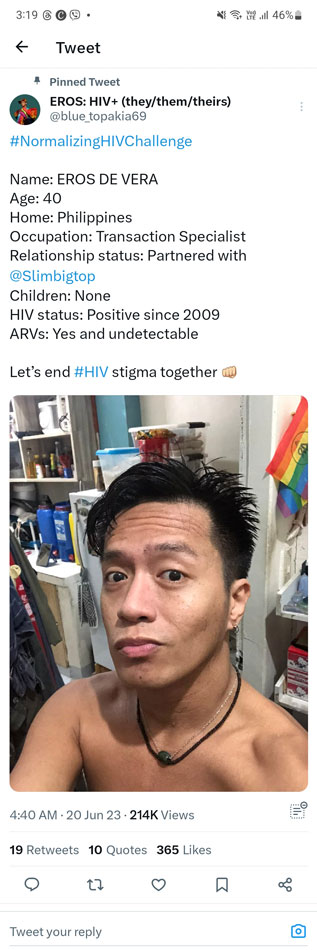
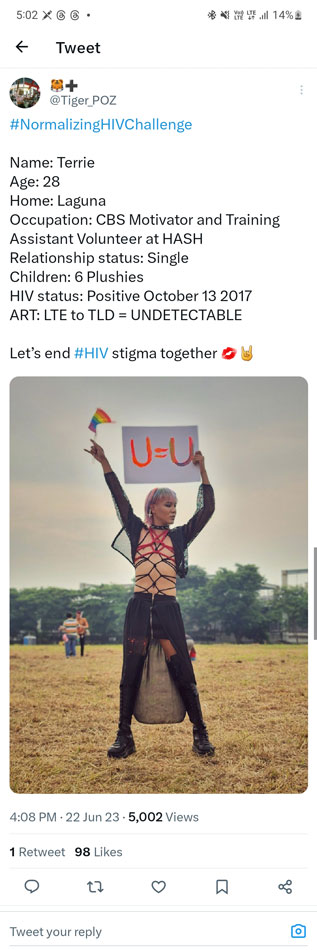
.jpg)
.jpg)
